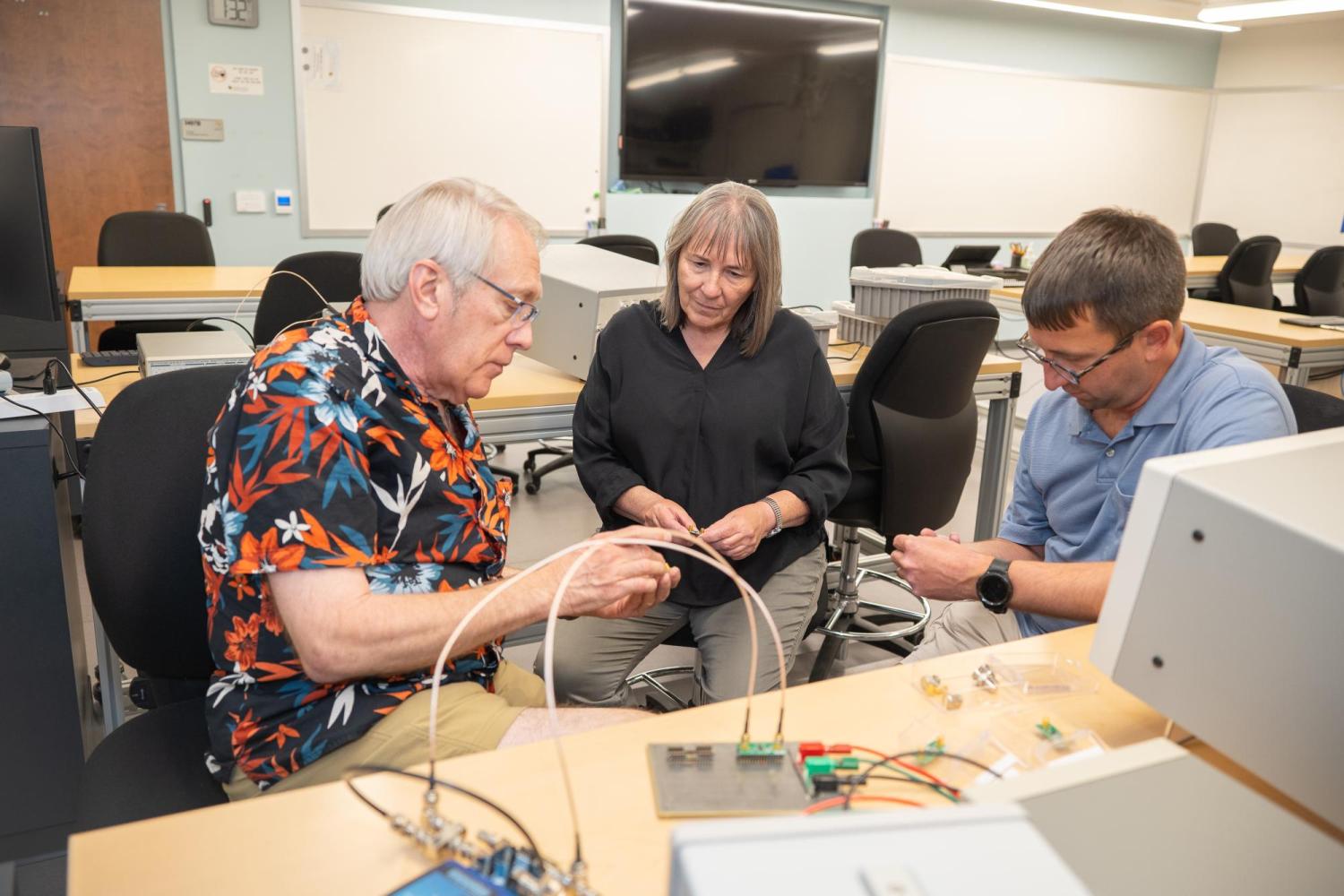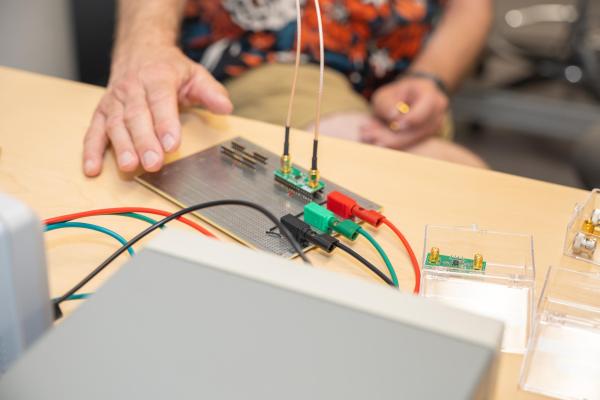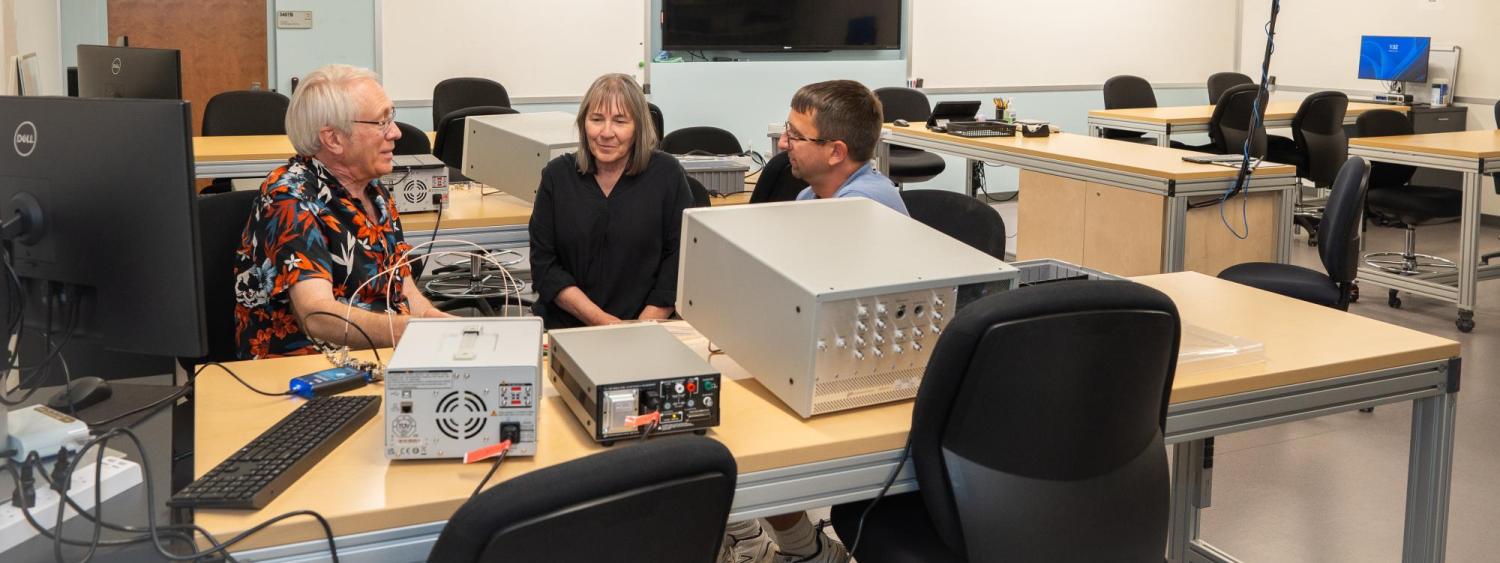
Learn More About Quantum at CU Denver
In the bright hum of CU Denver's quantum laboratories, the conversation isn't just about photons, qubits, or circuits—it's about connection.
Earlier this summer, University of Northern Colorado (UNC) Physics Professor Cynthia Galovich and Astronomy Associate Professor and Department Chair Charles Kuehn visited CU Denver to meet with Physics and Electrical Engineering Professor Martin Huber. Their mission: explore how UNC can integrate CU Denver's innovative quantum coursework into its own astronomy and physics programs, preparing students for a rapidly evolving quantum economy.
This collaboration—funded in part by an innovation grant from UNC's Provost's Office—is part of a broader effort to give faculty the opportunity to retool their expertise and gain new skills in emerging fields. It's also an example of how higher education partnerships are accelerating quantum education across Colorado, advancing the shared goals of the Elevate Quantum initiative.
From Idea to Action
For UNC, the spark was clear: give students the skills they need to thrive in the future quantum workforce. While UNC already offers a strong hands-on science curriculum, the faculty recognized a gap in applied quantum technology experience. CU Denver's Quantum Information Technology certificate program—anchored by rigorous lectures and robust, interdisciplinary laboratory courses—provided a ready-made model.
"Our goal is to prepare our students to be ready to contribute to the quantum workforce," Galovich explained. "Visiting CU Denver's labs gives us the chance to see exactly how these experiences are delivered, and how we can adapt them for our own curriculum."
Kuehn emphasized the importance of embedding quantum concepts into existing courses rather than creating stand-alone electives. "By integrating quantum into classes students already take—like optics—we can reach far more learners. This way, even students who might not think of themselves as 'quantum people' can still graduate with relevant skills."
A Statewide Quantum Movement 
This partnership comes at a pivotal moment. Colorado's quantum ecosystem is surging, thanks in part to the Elevate Quantum designation as a U.S. Economic Development Administration Regional Technology and Innovation Hub. The initiative connects universities, national labs, and industry partners to grow a quantum-ready workforce, backed by over $120 million in combined federal, state, private, and nonprofit investment.
The 2024 Quantum Workforce Development Roadmap calls for exactly this kind of inter-campus collaboration—sharing curricula, leveraging strengths, and expanding access to specialized lab experiences across institutions. As the report notes, building a robust talent pipeline means reaching beyond engineering majors to students in physics, astronomy, and other STEM-adjacent fields.
For CU Denver, this means opening its doors and sharing what works.
A Collaborative Model for Impact
Martin Huber sees the visit as a two-way learning opportunity. "One of the most important things we're doing is helping UNC see how much of their existing coursework already aligns with quantum concepts—they just haven't been framing it that way," Huber said. "Sometimes, it's a matter of adding a few examples or lab exercises to make the connection explicit."
That reframing is powerful. As Galovich noted, she realized during the visit that "a couple of labs we already run are very applicable to quantum.". With a few targeted modifications—and some shared materials from CU Denver—UNC can quickly enhance its students' exposure without overhauling its entire curriculum.
The approach also reflects the Elevate Quantum principle of resource efficiency. Rather than each institution starting from scratch, universities can adapt proven modules and share cost-effective lab setups. As Huber pointed out, many of the essential tools for teaching foundational quantum skills are more affordable than faculty expect.
"Our goal is to prepare our students to be ready to contribute to the quantum workforce," Galovich explained. "Visiting CU Denver's labs gives us the chance to see exactly how these experiences are delivered, and how we can adapt them for our own curriculum."
Why This Matters for Students
In both UNC's and CU Denver's programs, the ultimate focus is on student opportunity. Embedding quantum skills into a student’s coursework means they’ll be more competitive in a job market where, as Kuehn observed, "the industry is still figuring out what to call these roles." This is uncharted territory-companies know they need quantum-capable talent but are still defining job descriptions.
By getting ahead of that curve, Colorado students can position themselves at the forefront of a field projected to transform industries from cybersecurity to healthcare. They'll leave school not just with theoretical knowledge, but with practical, hands-on experience—the kind employers value most.
For Galovich, the benefits are clear: "Anything we can do to give our students more hands-on, applied experiences—especially ones tied to emerging technologies—makes them more marketable."
Strengthening Colorado's Role as a Quantum Leader
Partnerships like this one don't just help students— they help position Colorado as a quantum powerhouse. According to the Quantum Workforce Development Roadmap, the state already has significant advantages: a high concentration of STEM workers, world-class research institutions, and a thriving ecosystem of quantum companies.
What's needed now is scale. That means more trained graduates, more interdisciplinary programs, and more institutions contributing to the pipeline. By working together, CU Denver and UNC are modeling how that can happen.
Kuehn sees it as a shared mission: "We're part of something that's not just playing catch-up—we're helping shape the future needs of the industry in real time."

Elevating Quantum Education, Together
This visit is just the beginning. UNC has plans for another faculty member to take CU Denver's introductory lecture course this fall, with an eye toward further integrating quantum topics across its curriculum. The feedback loop will go both ways—UNC will share what works for its student population, and CU Denver will continue refining its program based on real-world classroom experience in different contexts.
It's the kind of partnership that aligns perfectly with CU Denver's mission as a "Real Optimist"—grounded in the belief that education works best when it works for all, and when institutions collaborate to serve students' diverse needs.
By blending UNC's strong tradition of applied science teaching with CU Denver's forward-looking quantum program, both schools are contributing to a more inclusive, more agile quantum talent pipeline—one that reflects the diversity of Colorado itself.
As Huber summed it up: "The most valuable thing about today's conversation is realizing how much we can accomplish together without reinventing the wheel. When we connect our strengths, we can prepare students for a future that's already starting to take shape."
In other words: millions of moments start here-some in Denver, some in Greeley, but all moving Colorado forward.
